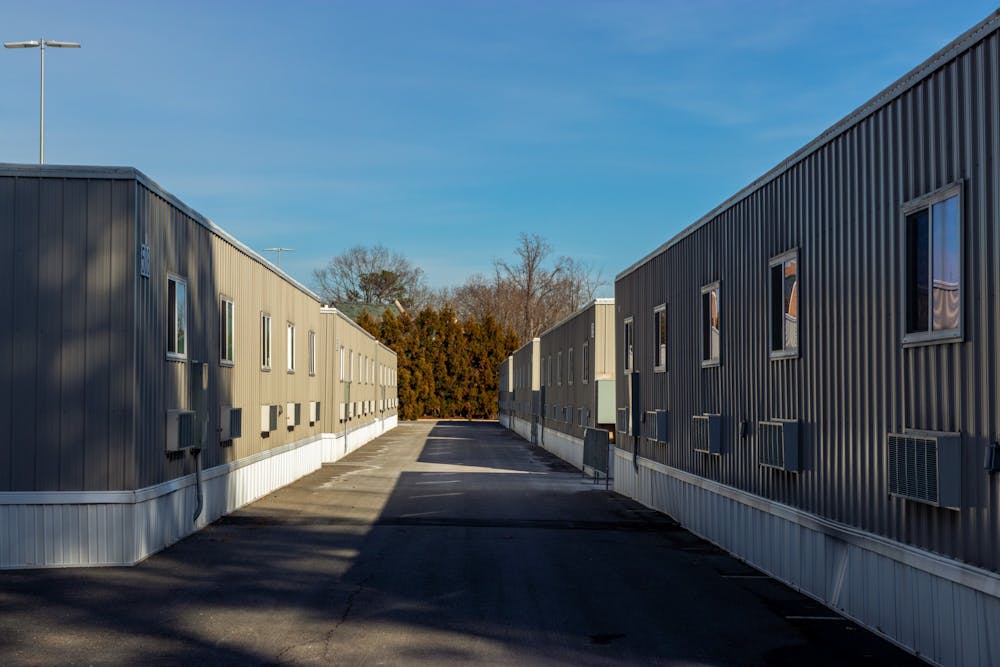COVID-19 cases at the University of Richmond increased by over 153% in the past week and the percentage of occupied isolation pods has more than doubled, according to the COVID-19 dashboard.
Despite reporting 110 new COVID-19 cases in the past week, UR remains in the Lime Stage of its Physical Distancing Framework, which permits in-person classes and emphasizes social distancing protocols, according to the UR website.

Data taken from the University of Richmond's COVID-19 Dashboard at the three most recent updates. Source: University of Richmond COVID-19 Dashboard
In response to the increase in positive cases, UR updated isolation protocols to require students to test negative before leaving isolation units and extended remote work until Feb. 14 for those at higher risk for serious illness from COVID-19, wrote David Hale, executive vice president and chief operating officer, Jeffrey Legro, executive vice president and provost, and Shannon Sinclair, vice president and general counsel in an email to community members on Jan. 26.
If the student continues to test positive, the isolation period could last up to 10 days after the first positive rest, according to the email.
UR administration decided to make those changes after consulting local public health officials, according to the email.
Many students remain unclear about COVID-19 policies despite the series of email updates. First-year Madi Norris is concerned about the Lime Stage’s ability to prevent positive cases on campus, she said.
“Compared to other schools, Richmond is not proactive about provisional testing in order to maintain the safety of students, faculty and staff,” Norris wrote in an email to The Collegian.
Senior Maya Lieberman indicated that she had received a lot of mixed messages from varying departments on campus after testing positive, she wrote in an email to The Collegian.
“I wish the school was more transparent about these changing policies so that students could know what to do as soon as they test positive and have an idea of what the next steps are,” she said.
Enjoy what you're reading?
Signup for our newsletter
Lieberman called the Office of Residence Life and Housing and the Student Health Center to request isolation information. While the health center believed she could remain in her apartment during isolation, Housing insisted that she should quarantine in an isolation unit, she said.
Students who test positive for COVID-19 may be able to isolate in place, as well as isolation pods, according to the health center’s website.
Patrick Benner, director of residence life and housing, did not respond to The Collegian’s request for comment.
Students who test positive for COVID-19 must isolate for five days from either the point of symptom recognition or a positive test or vaccination status, according to the email.
Lieberman said that she wished she had had more information going into the isolation pod and that UR communicated its requirements more clearly to students.
“After testing positive, I immediately looked up what the isolation/quarantine protocols are at UR and there was honestly very little information online, which didn’t help my anxiety,” she said.
Juan Mendez Guzman, a junior, felt uninformed throughout the process of isolation, they said.
“Maybe it was my fault on my part, but I didn't know specifically what I could or couldn't do during isolation,” they said. “Apparently you could go outside and take a short walk around the units. The most I was told was to get packed to move into isolation.”
To decide who needs to quarantine, the UR website states that all close contacts, regardless of vaccination status, will be tested the first, third and fifth days after coming into contact with the person who tested positive, according to the website.
However, that wasn’t the case for Mendez Guzman, who said they were not notified that they had come into close contact with someone who tested positive.
“I wasn't contacted at all,” they said. “Even though a day later I showed symptoms and tested positive from a kit that I bought myself because the school wasn't giving out tests yet.”
Overall, UR’s policies are inconsistent and highlight the administration’s lack of effort as a whole, Mendez Guzman said.
Students who have had a booster vaccination prior to exposure are not required to quarantine unless they test positive, according to the email. This policy includes those students who are within five months of their last primary dose of either the Pfizer or Moderna COVID-19 vaccines or within two months of their last primary dose of the Johnson & Johnson COVID-19 vaccine.
That policy also applies to people who have reported contracting COVID-19 within the past 90 days. However, they should continue to follow UR’s testing and masking policies, according to the email. If a student becomes symptomatic, they should stay home and test immediately.
Ruby Nguyen, a first-year, said UR’s vaccine policies are sufficient.
“While it’s unrealistic for UR to require COVID-19 booster vaccinations, they are properly providing students, who choose to receive them, with resources to do so,” Nguyen said.
Quarantine and isolation periods are subject to change when campus policies no longer match those of either state or national recommendations, according to the UR website. In other words, these requirements are volatile.
Some students, including Mendez Guzman, believe that UR hasn’t done enough to inform community members or curb the virus’ spread.
“The university is doing minimal effort at this point to curb the virus, which basically just follows the national trend of not giving a shit anymore,” Mendez Guzman said. “An email or two describing policies is alright, but what really matters is practice.”
As of now, UR maintains its universal indoor mask mandate and all students, staff and faculty are required to wear masks indoors, regardless of vaccination status. Last week, the three-court gymnasium in the Weinstein Center for Recreation shut down for four days because of non-compliance with the mask mandate.
“While the mask mandate is strict enough, students don’t always follow it,” Nguyen said. “If masks are to make a difference, it’s up to the students.”
Contact assistant news editor Sarah Noorbakhsh at sarah.noorbakhsh@richmond.edu.
Support independent student media
You can make a tax-deductible donation by clicking the button below, which takes you to our secure PayPal account. The page is set up to receive contributions in whatever amount you designate. We look forward to using the money we raise to further our mission of providing honest and accurate information to students, faculty, staff, alumni and others in the general public.
Donate Now



